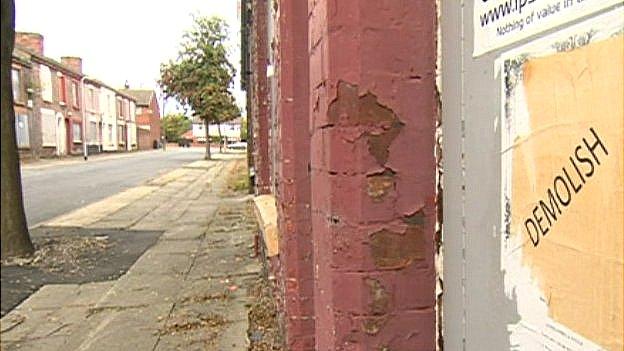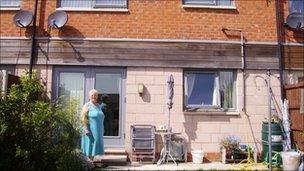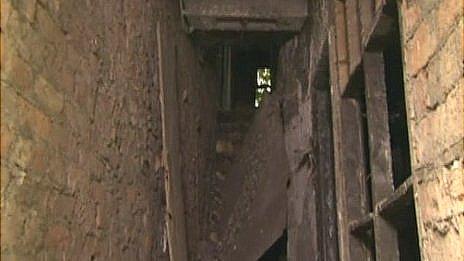Liverpool's Welsh Streets: 'Living in limbo' near Ringo Starr's birthplace
- Published

The peeling paint and boarded-up terraces on Liverpool's Welsh Streets
Plans to redevelop Liverpool's rundown Welsh Streets area have been put on hold after Communities Secretary Eric Pickles called for a public inquiry. But what is life there like for the people waiting to find out if their homes will be revamped or bulldozed?
The tinned-up houses in Wynnstay Street, Liverpool, are leaning precariously as the chimneys, roofs and brickwork list towards the ground.
Green shoots sprout out of the brickwork.
The street is eerily quiet aside from the odd passing taxi en-route to 9 Madryn Street, four roads down, the birthplace of Ringo Starr, scarred with graffiti. A yellow Magical Mystery Tour bus drives by the end of the street.
Behind the metal sheets, the hall walls have crumbled, exposing the wooden frame like a skeleton.
The staircase has gone and there are pigeon feathers and faeces carpeting the floor.
Paint is peeling away and there are cobwebs and discarded bits of metal pipe. A once-elegant tiled porch is green with moss in the grouting.
The facades of the abandoned terraces in Powis Street are painted black after posing as Birmingham's slums for the filming of the BBC series Peaky Blinders.
Welcome to Welsh Streets.
On Tuesday, many residents were dismayed when the £15m revamp plan for the streets was called in by Communities Secretary Eric Pickles for a public inquiry.
It is the latest stage in more than a decade of trying to find a solution for the near-abandoned streets that have an enviable view of the city's Anglican cathedral.
The proposals by social housing provider Plus Dane Group would see 150 new homes built, 280 demolished and 37 properties, including Ringo Starr's birthplace, renovated.
'So desolate'
Veronica Griffiths, who has lived in Gwydir Street for a decade, said: "We can't do anything like decorating as you don't know whether to bother or if you're going to be demolished. We are just left in the middle.

The Powis Street houses were used as a backdrop to Birmingham's slums in Peaky Blinders
"I've seen rats running down the streets and it's not pleasant walking through all the empty streets as it's so desolate.
"I want to move into a new home but now we can't because of Eric Pickles.
"We're living in limbo and it's lonely.
"Everyone keeps going on about Ringo Starr's house. Well he hardly lived in the bloody house and what's he ever done for Liverpool? He doesn't even like the place."
Clearly house-proud, her terrace house has a hanging basket by the front door.
Some residents have placed "Demolish" posters in their windows making their views clear in a single word.
The homes were part of nine areas identified as "Pathfinders", which intended to replace terraced houses with modern homes with gardens.

Mary Huxham said she felt at home as soon as she moved from the Welsh Streets
However, the scheme was criticised by the National Audit Office and was eventually wound up in 2010 by Housing Minister Grant Shapps, leaving many residents in limbo.
In Liverpool, the £15m planning application was approved by the city council but stalled by the government when it announced a public inquiry earlier this week.
Liverpool Mayor Joe Anderson said the residents had been "badly let down" by the decision.
It was, he said, hugely frustrating and disappointing for the local community.
The properties are nicknamed the "Welsh Streets" as they were built by Welsh workers in the late 19th Century and named after Welsh towns, villages and valleys.
'Disappointment after disappointment'
Louise Davies, project director at the Plus Dane housing group, said they had "factored in" the decision being called in and were monitoring the situation closely.
She said they had 70 residents who had suffered "disappointment after disappointment" while waiting to be re-housed into new-build properties.
Campaign group Save Britain's Heritage bought a house in Madryn Street and has spent £3,000 renovating it with Perspex windows. A couple now live there.
Jonathan Brown, from the group, said a decade ago the houses were in better condition and people were "happy to stay".
"But since 2003 there has been a process of buying up and boarding up," he said.
"We wouldn't be fighting for these houses if they were beyond salvation."
He said engineers and estate agents had examined the houses and found they were "entirely viable".
Mary Huxham, 75, lived in Powis Street for 68 years but moved to a new home in 2007.
She said she was glad to leave the "fungus on the walls, ice on the inside of the windows".
"I felt nothing but relief when I moved," she added.
"They say memories are in bricks and mortar, but they're not. they're in your heart."
Ms Huxham said the "worst thing is the old people who were waiting to move but passed away".

The Welsh Street homes remain boarded up until at least the outcome of the public inquiry
"There was one woman who was looking forward to buying a pink three piece suite - but she never did get it," she added.
Mr Brown said she welcomed the public inquiry as an opportunity to expose the "managed decline of the area" at an independent forum.
The Department for Communities and Local Government maintains that "in this instance that the proposal may conflict with national policy and has greater than local importance".
Mr Pickles has said arrangements for a public inquiry would be made shortly and details advertised.
Planning Minister Nick Boles said the application had attracted national controversy and had broader implications for the historic environment.
But for some living there, accepting those plans is the only option.
Resident Nina Edge, who had previously opposed demolishing the homes, said she accepted the planning application because it was a "nightmare for all the residents who have lived with 10 years of constant worry".
"I can't express what that does to your family and health."
- Published14 January 2013
- Published24 July 2013
- Published24 September 2013